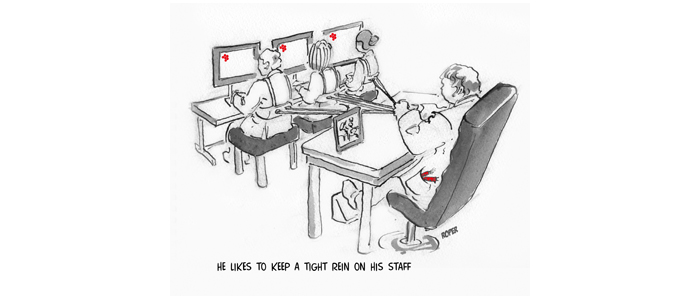
Do you feel that the organisation is ‘yours’ and running it is all down to you? Are you increasingly resenting the fact? Here’s how to turn it around so you can relinquish control, successfully.
This is a very common assumption among entrepreneurs who have started their own company and nursed it through the first crucial (1G) years of establishing a brand and a pipeline of business. They’ve put in the hours, lost the sleep and gone grey with the worry of those early years. Now the company has grown and a small but growing team is there to share the burden – and the joys – of shepherding the company into its teenage years. But will the business founder and owner let go – will he heck!
The reason is a combination of personality traits and habit. It’s very likely that if you are driven and entrepreneurial enough to get your own company off the ground and tenacious enough to see it through its early years, you very probably feel a very high level of psychological ownership which makes it hard for you to let others step in and help when they finally come along to join you. This type of personality is also often a perfectionist with a strong sense of how to do things ‘right’ – nobody else can do it as well as you can. And after a few years of doing it your way and doing it pretty much all by yourself, you’ve probably created a solidly well-ingrained habit that is hard to break.
Not that any of this will stop you complaining that ‘nobody ever does anything around here except me’, or ‘why does everything end up on my desk?’ Typically, by this stage, you are completely blind to the fact that you hover and micro-manage to such an extent that your staff have pretty much given up on doing anything without instructions from you. They’re just sitting back and waiting to see what you want them to do – while you’re waiting for them to finally wake up and show some initiative.
What are the problems with this?
Having got to this stage, you are probably finding it quite stressful having people work for you whose only function in life seems to be to increase, not ease your burdens. It’s very likely that you will assume that you have simply chosen the wrong people – that something went wrong in your recruitment – and you may go through several employees before it dawns on you that the same pattern seems to emerge again and again, and that the one common factor appears to be … you.
Now you have a choice: change your management style and allow others to step up and take responsibility from you, or recognise that you will always ultimately want to be in control and accept that you will always need to give instructions and set the standards.
What is the answer?
There isn’t a right answer; some business leaders feel increasingly uncomfortable the more they relinquish control. They find that they have to take precious time away from what they perceive as their day job – handling things personally for their clients – to manage staff and resolve endless queries. These leaders will feel happier staying ‘hands-on’, though the price they pay is that their organisation will never grow larger than the span of clients, projects and staff that they can personally keep tabs on.
Others, however, feel that they have spent long enough taking all the burden of control themselves, and find the motivation to change their management style and let others in. They do of course need to recognise that they will never again have quite such fingertip control over standards in their company, but this is more than offset by the advantages they perceive in building a team and sharing the load. These leaders will also find that they have successfully negotiated the first hurdle in creating the foundation for a significantly larger business.
[box style=”1″]Kate Mercer has recently been writing about how your organisation changes as it grows, from an energetic toddler stage (first generation, or 1G), to the moody teenager stage (second generation, 2G), before it reaches (if it ever does) the relative calm and maturity of the adult stage (third generation, 3G). It’s a way of looking at your organisation that is unfamiliar to most business leaders, especially professional services experts who are hugely trained and experienced in their professional skill, but generally not experienced or trained as managers. It’s why keeping tabs on everything often seems to get harder over time as your organisation grows. Perhaps the answer is to make some simple changes to your management style? Over the next few months, Kate will be writing articles on the most common mistakes people make in running 2G organisations, and how to start to change your thinking. This is the first of the series.[/box]


About The Author: Kate Mercer
Kate creates working environments that allow you, your people and your organisation to produce great results through communication, real teamwork and streamlined working practices.
More posts by Kate Mercer